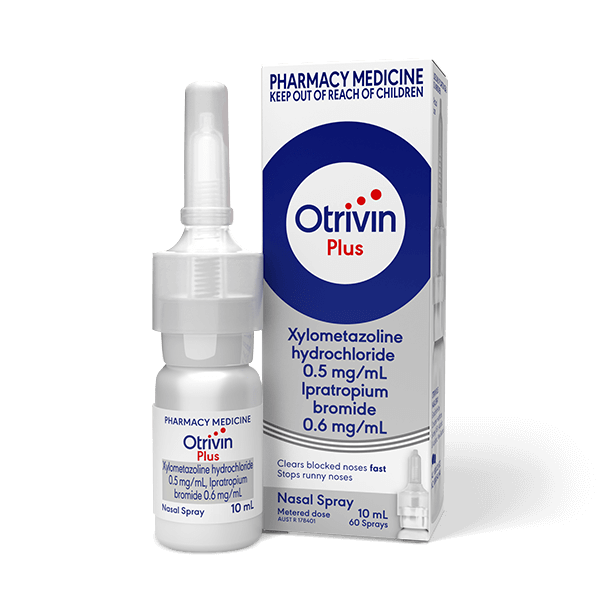How To Use A Nasal Spray Correctly: Steps & Guide.
A blocked nose can have a negative impact on a daily life and many patients seek relief. Nasal congestion can be caused by having a common cold or sinusitis. Whatever the cause, you may consider reaching for an over the counter nasal spray.
There are different types of nasal spray. Some contain medications to target the biological processes going on in your nose, and some use natural ingredients like sea water to gently clear your nose.
So, if you’re looking for a nasal spray for nasal congestion or a gentle saline nasal spray for babies, we have the information you need!
Why is my nose blocked?
Inflammation of the mucous membranes in the nose can cause swelling and congestion of the nasal passages. Nasal congestion hinders breathing, leads to the build-up of thick mucus, causes a frequent desire to blow the nose; disturbs sleep and causes snoring. In short, nasal congestion can have a negative impact on daily life.1,2
There are many common causes of nasal congestion, including:1,2
- Upper respiratory viral infections (common cold or flu)
- Sinusitis
Of these, the common cold is one of the most common causes, and can affect adults around two to four times per year, and young children around six times per year. Nasal congestion is the most common symptom among common cold sufferers.1,2

What is a nasal spray?
Nasal decongestant spray can be used to relieve congestion, for example to manage the symptoms of allergic rhinitis and persistent rhinitis.3
The product is sprayed directly into the nostrils.
Nasal sprays vary in shape and size, but the technique remains the same and instructions will come with the product. You will need to prime the nasal spray if you have not used it before, or if you have not used it for two weeks. Please make sure you follow the manufacturer's instructions.3
Unblock your nose with an Otrivin nasal spray.

Otrivin nasal decongestant sprays relieve your congestion. Medicated Otrivin nasal sprays containing xylometazoline acts in 5 minutes.
Otrivin medicated nasal sprays contain xylometazoline, which is indicated for the symptomatic relief of nasal congestion due to common cold and allergic rhinitis. Otrivin Plus medicated nasal sprays have additional active substances like ipratropium.1,2
Xylometazoline causes constriction of nasal blood vessels, thus reducing swelling. This in turn reduces the resistance of your nasal airways to airflow, helping you to feel less congested. Otrivin nasal sprays have been used by several million patients over decades.1,2
How to use an Otrivin Adult nasal spray.
Instructions:
*These instructions are for Otrivin Adult. Instructions may differ depending on the product.
1. Do not cut the nozzle. The metered dose spray is ready to prime before use.
2. Clear your nose.
3. Remove protective cap.
4. Before using for the first time, prime the pump by actuating 4 times. Once primed, the pump will normally remain charged throughout regular daily treatment periods. If the spray is not ejected during the full actuation stroke, or if the product has not been used for longer than 7 days, the pump will need to be reprimed with 4 actuations. Be very careful not to spray in the eyes or mouth.*
5. Hold the bottle upright with thumb under base and nozzle between two fingers.
6. Lean forward slightly and insert the nozzle into the nostril. Spray and breathe in gently through the nose at the same time.
7. Repeat with the other nostril.
8. Clean and dry the nozzle before replacing back the cap right after use.
9. To avoid possible spread of infection, the spray should only be used by one person.
If symptoms persist for more than three days, consult your doctor or pharmacist. Only one person should use each pack to avoid the spread of infection.
Consider your options to unblock your nose.
Otrivin comes in a wide range of products. For a way to clear your nose, try the Otrivin Seawater range.
References:
- Eccles R, Eriksson M, Garreffa S, et al. The nasal decongestant effect of xylometazoline in the common cold. Am J Rhinol. 2008;22:491-496
- Eccles R, Martenssen K, Chen S. Effects of intranasal xylometazoline, alone or in combination with ipratropium, in patients with common cold. Curr Med Res Opin. 2010;26:889–899
- NHS. University Hospital Southampton NHS Foundation Trust. Patient information factsheet. How to use a nasal spray. Available from: https://www.uhs.nhs.uk/Media/UHS-website-2019/Patientinformation/Respiratory/How-to-use-a-nasal-spray-patient-information.pdf (last accessed March 2020)










